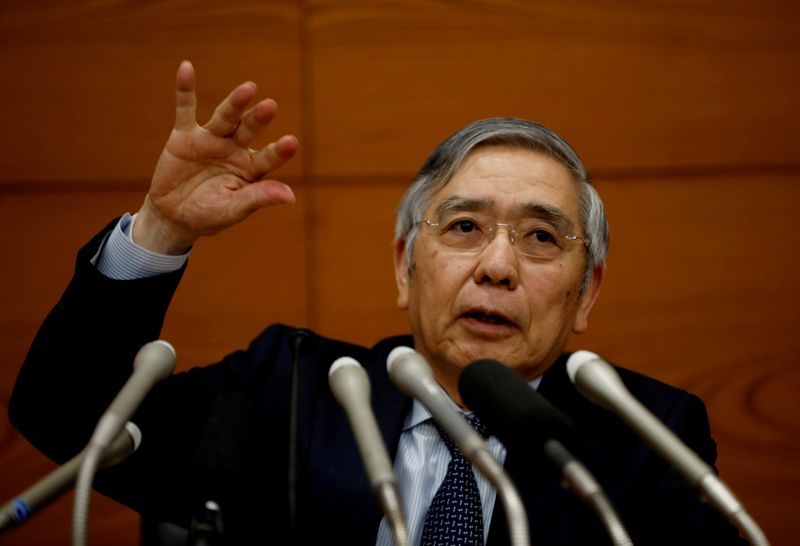By Leika Kihara
TOKYO (Reuters) -Bank of Japan (BOJ) Governor Haruhiko Kuroda, who retires in April, said his decade-long monetary experiment that injected $3.7 trillion into the economy to shock the public out of a deflationary mindset was "half successful."
Hand-picked by deceased former Prime Minister Shinzo Abe in 2013, Kuroda jolted the conservative central bank and markets by deploying a "bazooka" asset-buying programme to show his resolve toward achieving the 2% inflation target in roughly two years.
Aside from pushing down borrowing costs, Kuroda's bazooka sought to influence public perceptions and shake the public out of deflation with a huge blow of monetary stimulus.
"It was meaningful and has had some effect," Kuroda told parliament on Wednesday, when asked by a lawmaker whether he thought the measure successfully influenced public perceptions.
"But that alone isn't sufficient to achieve our 2% inflation target. In that sense, the policy was half successful," he said.
The comments come at a time central banks across the world wrestle with the challenge of effectively communicating their policy intention to the public.
Kuroda, whose second, five-year term ends in April, leaves the BOJ with a mixed legacy: his massive stimulus is praised for pulling the economy out of deflation, but it strained bank profits and distorted market functions with prolonged low rates.
Critics also blame Kuroda for wrong-footing markets in 2016 by abruptly introducing negative interest rates. The decision, which jolted markets and proved hugely unpopular among the public, was made by a 5-4 vote.
Kuroda said he had discussed the negative rate idea with BOJ board members prior to the policy meeting.
"Many of them appeared to think it was appropriate. But some thought it was premature, and wanted to spend more time looking at the situation," Kuroda said, defending the move as having won approval by most of his fellow board members.
Kuroda's bazooka was initially praised for boosting stocks, brightening corporate sentiment and reversing a debilitating yen spike that had hurt the export-reliant economy.
But as the positive effect began to fade and its huge bond buying faced limits, the BOJ switched to a policy targeting interest rates starting with the January 2016 decision to adopt negative rates.
Eight months later, it added a cap on long-term rates in a policy called yield curve control (YCC) that is still in place.
Many analysts expect the BOJ to continue dismantling Kuroda's radical stimulus policy under his successor Kazuo Ueda.
The BOJ has seen its balance sheet expanded by roughly 497 trillion yen ($3.7 trillion) since Kuroda deployed the bazooka stimulus, and now owns half the Japanese government bonds (JGB) market, according to central bank data.
($1 = 134.6000 yen)
